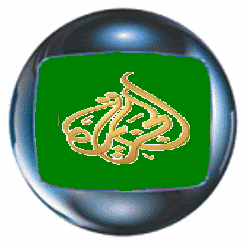Al-Jazarya
Founding attempt
Abdelaziz Benchicou, an Algerian politician and journalist, wanted to create a local news television network favoring the regional views in 1978. He called it Al-Jazarya (الجزائر), Arabic for “the islands” and also for Algeria. This was not well recieved in Paris, remembering earlier feelings of autonomy, and his station was not licensed by the French broadcasting authorities, claiming that it would break up the monopoly the French government held on television. Benchicou was not dissuaded, and he kept Al-Jazarya as his dream.
Muhammad al-Ghamdi was an exiled Saudi Arabian who was living in Egypt by then. The former Saudi Minister of Communications between 1973 and 1975, he was forced to flee to exile after the deposition of King Faisal I al-Saud by Muslim radicals. In Egypt he was able to enter the television circuit and was quickly promoted to vice-president of one of the most important Egyptian television networks.
In 1980, Iraaq invaded Persia starting the Persia-Iraaq War. At the time, nearly every Arab country backed Iraaq. Al-Ghamdi sent journalists not only to Iraaq but also to Persia. As the only one to do so the Persian point of view of this war was seen. This caused him trouble and the Egyptian government (which was backing Iraaqi pretensions) pressured the network to dismiss him. Al-Ghamdi was dismissed leaving him with the idea that, although Egypt was one of the most democratic Arab countries, the press was not exactly free. Between 1980 and 1982 he stayed at a newspaper in Alexandria.
Benchicou and al-Ghamdi met during a press congress held in Cairo in 1982. They exchanged ideas about the way they saw freedom of speech and press and al-Ghamdi found in Benchicou someone who shared his own way of thinking.
Founding
By 1982 Egypt started to withdraw its backing of Iraaq as the Iraaqi regime was heading deeply towards religious radicalism. The Egyptian regime became critical of Baghdaad and started to allow criticism on the media.
Since Egypt was still one of the Arab countries where freedom of the press was more developed, as the country had the largest audience in the Middle East and was thus the major exporter of culture to the Arab world, al-Ghamdi and Benchicou concluded that it would be here that they would have a chance to create their television network.
Al-Ghamdi made contacts with other wealthy exiled Saudis in order to convince them to invest in their television project and was successful. Saudi investors funded the project and it went on the air as one of the first independent television networks of Egypt. They kept the original name as a metaphor for an island of free thinking.
Al-Jazarya started to broadcast in 1983 first as a local channel in the area around Cairo. Soon it experienced growth as the television network become increasingly popular in Cairo. Statellites were rented permitting Al-Jazarya to cover a much larger area. Journalists were sent once again to the Perso-Iraaqi War at a time when Iraaq was losing its Arab supports. Al-Jazarya journalists were able to show both sides in the conflict and the images taken were sold to world-wide television networks permitting another injection of capital and a growing international notoriety. The relatively impartial point of view espoused by Al-Jazarya caused all Al-Jazaryan journalists to be expelled from Libya in 1984. They were also not permitted into Saudi Arabia.
Al-Jazarya also made it possible for the world to know about the war in the Moghul National Realm which had been invaded by SNORist Russia.
Franchising
By 1984 Al-Jazarya was already reaching all of Egypt and al-Ghamdi franchised Al-Jazarya to Syrian investors starting a new stage of the network’s evolution. Al-Jazarya Damascus went on the air in 1986 and this was followed by Al-Jazarya Beyruth in 1987. All three networks remained at some level independent from each other but united in the ideal of a free press in the Arab world.
The Gulf War (1990-91) permitted the network, once again, to show all points of view from both sides of the conflict, but soon the Iraaqi government expelled Al-Jazarya journalists when it decided that those journalists were going too far in showing the Iraaqi actions. The interviews with polemic people, such as the religious agitator Osama BinLadin, also helped to gain an audience, so that critics from governments accused the network of spreading subversive ideas.
Since then Al-Jazarya journalists have covered all Arab conflicts and major Arab world events always with much impartiality. As a result, the company has been recognized internationally as an example of freedom of press. The company has also made huge profits selling images and news footages to other television networks. It became self-sufficient through advertising in 1992, ending the need for subsidization from investors. That same year the network acquired its own statellites.
The growth of the company permitted the opening of two other franchises, in Kuwayt (1994), and in Qatar, in the Thousand Emirates (1996). The company also signed agreements with some of the major international television networks for sharing facilities and news footage.
Due to Al-Jazarya's role in developing freedom of press in the Arab world, Abdelaziz Benchicou and Muhammad al-Ghamdi were jointly awarded several press prizes, among them the Nobel Prize for Journalism, in 2005.
Viewership
Today Al-Jazarya is the most important news television networks in the Arab world. Viewers are estimated at 50 million daily. The company is completely sponsored by advertisements and covers most of the Arab countries through retransmission via statellites. The network can also be seen in some areas of southern Europe, Persia, northern India and West Africa.
Due to its recognized impartiality many people believe Al-Jazarya to be more trustworthy than the government-controlled television networks of most Arab countries.
Al-Jazarya opened a sixth franchise in Marrakesh, Maghreb, in 2008. Also the opening in 2012 of a sports theme channel (Al-Jazarya Sports) was due broadcasting from Cairo.


